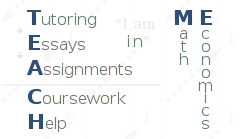Section 16: Problem 5 Solution
Working problems is a crucial part of learning mathematics. No one can learn topology merely by poring over the definitions, theorems, and examples that are worked out in the text. One must work part of it out for oneself. To provide that opportunity is the purpose of the exercises.
James R. Munkres
Let
and
denote a single set in the topologies
and
, respectively; let
and
denote a single set in the topologies
and
, respectively. Assume these sets are nonempty.
(a) Show that if
and
, then the product topology on
is finer than the product topology on
.
(b) Does the converse of (a) hold? Justify your answer.
(a) Every basis set in
is a basis set in
(if one of the sets is empty, then, both topologies are trivial).
(b) Yes (assuming the sets are nonempty). If
is open in
,
,
is open in
,
, then
is open in
and, therefore, open in
. Therefore, there exists a basis set
in
such that it is a subset of
and it contains
. Therefore, there are open sets
and
such that
and
. So,
is open in
and
is open in
.
If
and
, then, assuming
, the product topology on
is strictly finer than the product topology on
. Indeed, suppose
is open in
but not in
. Then, there is some
such that for every set
open in
,
implies
. Now,
is open in
. If it were open in
, there would be a basis element
such that
for some
, and then we would have
where
is open in
, contradicting the assumption on
.
In fact, all of these could have been easily proved using the following lemma.
If
and
are nonempty, then
is open iff
and
are open in
and
, respectively.
This lemma should have been given in the text or exercises, unless I missed it.
